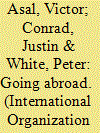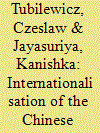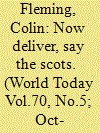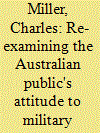|
|
|
Sort Order |
|
|
|
Items / Page
|
|
|
|
|
|
|
| Srl | Item |
| 1 |
ID:
137029


|
|
|
|
|
| Summary/Abstract |
Many authoritarian regimes selectively provide critical segments of the population with privileged access to goods and services, expecting political support in return. This article is interested in the effects of this regime strategy: Is violent opposition less likely to occur in subnational regions bound to the ruling elite through such patron–client networks? For its empirical analysis, the article makes use of crowdsourcing data on the number and geospatial distribution of fatalities in the Syrian civil war from March 2011 to November 2012. In terms of selective goods provision, the focus is on the electricity sector. Satellite images of the earth at night are used to proxy spatial variations in the public distribution of electricity in times of power shortages. These data are complemented with information from the last Syrian population census of 2004. Estimations from fixed effect logit models lend support to the hypothesis that the risk of violence has been lower in subdistricts that have been favored by the ruling regime in terms of preferential access to material goods. This hypothesis is further corroborated with qualitative evidence from Syrian localities.
|
|
|
|
|
|
|
|
|
|
|
|
|
|
|
|
| 2 |
ID:
137087


|
|
|
|
|
| Summary/Abstract |
This piece examines the substance of EU democracy promotion from a comparative point of view and from a perspective placing under inquiry the meaning of the idea of liberal democracy itself. Instead of assuming that the democratic ideal that the EU promotes (‘liberal democracy’) has a clear, fixed meaning, the article examines in detail what actually constitutes the ‘ideal of democracy’ at the heart of EU democracy promotion, and compares this vision to that which informs the democracy promotion of the US. It argues that interesting differences, and shifts and oscillations, in the models of liberal democracy that the EU and the US promote exist and that these are important to note in order for us to fully appreciate how the substance of EU and US democracy support can be shaped by conceptual and ideological debate on the meaning of democracy. This dynamic is particularly relevant today, in the context of the recent attempts to develop transatlantic dialogue on democracy support. This dialogue, it is suggested, plasters over some subtle but important ideological cracks over what is meant by democracy in EU and US democracy support.
|
|
|
|
|
|
|
|
|
|
|
|
|
|
|
|
| 3 |
ID:
137090


|
|
|
|
|
| Summary/Abstract |
From the perspective of Kosovo, this article contributes to a growing literature focusing on the substance of donor-driven democracy promotion. Drawing on extensive empirical research between 2010 and 2012, the research provides greater insights into which donors are providing what sort of assistance; how the content and focus of aid are decided and formulated; and the behaviour of the European Union (EU) and other large donors compared with small bilaterals and private foundations. By including the category of ‘governance-oriented’ assistance to classify donor initiatives, a more nuanced mapping of priorities and strategies is offered, which distinguishes between those measures designed to engage civil society (developmental), those focusing on institutions and elite level change (political), and interventions specifically designed to promote closer interaction between government and nongovernmental actors. The conclusion reached is that, although overall levels of aid to Kosovo have remained relatively stable since 2008, donor behaviour is in flux, with evidence of an emergent distinction between what larger donors offer and the provision of smaller bilaterals and private foundations. This, it is argued, has serious implications for the capacity of the EU to continue providing extensive aid across a wide range of issues and policy areas as part of its pre-accession
|
|
|
|
|
|
|
|
|
|
|
|
|
|
|
|
| 4 |
ID:
134982


|
|
|
|
|
| Summary/Abstract |
Existing literature on contentious political movements has generally focused on domestic political activity. Using the new Minorities at Risk Organizational Behavior–Middle East data set (MAROB-ME), which contains organization-level data for 104 ethnopolitical organizations in the Middle East and North Africa, we analyze the decision of both violent and nonviolent organizations to engage in political activity transnationally. Among the results, we find that diaspora support is associated with transnational nonviolent protest, whereas foreign state support and domestic repression increase the use of transnational violence. The most robust finding, however, is that participation in the domestic electoral process consistently reduces the likelihood that an organization will engage in any political activity abroad.
|
|
|
|
|
|
|
|
|
|
|
|
|
|
|
|
| 5 |
ID:
134275


|
|
|
|
|
| Summary/Abstract |
Governmental support for nonstate actors designated as terrorist organizations is not only a policy that carries significant international and domestic costs; it further poses a theoretical challenge to structural realist thinking about alliance politics in international relations. By debating, firstly, the utility of terrorism as a means to influence systemic power distribution, and, secondly, the functional equality of nonstate actors, this article considers under what conditions state sponsored terrorism occurs despite the expected security loss. Drawing on the example of Iraq between 1979 and 1991, the assumption that the interplay of external security challenges—as well as domestic dissent as an intervening, unit-level factor—affects governmental alignments with terrorist groups will be reviewed in the cases of the Iranian Mujahedin al-Khalq Organization, the Syrian Muslim Brotherhood and armed Palestinian factions. The article concludes by addressing whether state sponsorship of terrorism is inevitably linked to policy failure or whether it could be seen as a good investment to balance external and internal security challenges successfully.
|
|
|
|
|
|
|
|
|
|
|
|
|
|
|
|
| 6 |
ID:
136954


|
|
|
|
|
| Summary/Abstract |
This article examines the participation of China's Yunnan Province in the Greater Mekong Subregion (GMS) in order to understand the dynamics behind the regionalisation and internationalisation strategies adopted by a Chinese subnational state. It argues that the Yunnan case demonstrates the outflow of state capital—both national and provincially based—to have been instrumental in harnessing Beijing's and Kunming's political support for programs of subregional economic cooperation. This political support has led to a state capital alliance underpinning the economic expansion of provincial state capital into the GMS. It also argues that subregional governance arrangements, such as those featuring in the GMS, embed the competitive advantage of state capital through new forms of extra-territorial governance that ostensibly de-emphasises the political dimensions of state capital. The internationalisation of Yunnan subnational state is reflected in its political strategy of subregional governance. These changes point to complex rescaling of not just national state but also subnational states in Asia that find expression in variegated regional and subregional political projects.
|
|
|
|
|
|
|
|
|
|
|
|
|
|
|
|
| 7 |
ID:
135409


|
|
|
|
|
| Summary/Abstract |
As support in Scotland for pro-independence parties rockets, the big question is whether Westminster will honour its eleventh-hour promises of defence and foreign affairs – is exactly what most Scots appeared to want. The Scottish Attitudes ... is now the big question. If powers are not forthcoming, it will make next year’s UK general election ... a membership of over 70,000, is now the third largest political party in the UK, overtaking the Lib Dems.
|
|
|
|
|
|
|
|
|
|
|
|
|
|
|
|
| 8 |
ID:
137089


|
|
|
|
|
| Summary/Abstract |
This article analyses the substance of the European Union's and United States' democracy assistance in Ethiopia in 2005–2010. Does this case reveal a transatlantic split, whereby the EU focuses on the external context and the US on the partial regimes of embedded, liberal democracy? Emphasizing the importance of institutions in analysing how interests and ideas affect democracy assistance, the article investigates how the substance may differ between the European Development Fund (EDF), European Instrument for Democracy and Human Rights (EIDHR), US Agency for International Development (USAID) and the National Endowment for Democracy (NED). The analysis finds a transatlantic split whereby the EU focused more on the external context and the US more on the partial regimes. This transatlantic split can be explained by the combination of ideas and institutions. More specifically, it reflects a difference between the EDF and USAID in their focus on ownership, alignment and harmonization in democracy assistance. The combination of interests and institutions played a less significant role in explaining the substance of democracy assistance, as USAID emphasized the partial regimes, despite political control from the State Department.
|
|
|
|
|
|
|
|
|
|
|
|
|
|
|
|
| 9 |
ID:
134247


|
|
|
|
|
| Summary/Abstract |
Australia, like most other developed democracies, is often alleged to suffer from ‘casualty phobia’. The perception that the Australian public will not tolerate casualties in foreign conflicts has shaped the decisions of both civilian and military policy makers. Measures taken to protect Australian forces from casualties may, for instance, also serve to increase the risk to civilians in the country to which they are deployed. The USA underwent a similar debate some years ago. Innovative public opinion research techniques—especially ‘survey experiments’ which allow researchers to establish causal relationships by consciously manipulating one variable while holding others constant—have established that the American public are not reflexively casualty-phobic and that the impact of casualties on public opinion can be outweighed by other factors, such as the public's confidence in the mission's overall success. In this article, the author replicates one of the key survey experiments from the US debate, suitably adapted to Australian conditions, with a nationally representative sample of Australian voters. The author finds that the same pattern holds in Australia as in the USA: casualties do lower public support for a given mission, but the mission's chances of success matter more.
|
|
|
|
|
|
|
|
|
|
|
|
|
|
|
|
| 10 |
ID:
135159


|
|
|
|
|
| Summary/Abstract |
This report surveys the principal space events of 2013 and analyzes the central trends that can be discerned in government space activities in nations around the world. The article refers to cooperation between countries, to trends in space security, and reviews the space policies and activities of the leading nations as well as emerging ones. The proportion of government funds has declined in recent years; at the same time, space is one of the fields in which commercial endeavors are closely tied with government activities, and is strongly affected by the dynamics and politics between nations. The international community is struggling over the nature of activities in space, world leadership, and what should be permitted and what should be prohibited. Alongside this struggle for control and influence, many nations have come to understand that challenges and threats exist which require cooperation to address adequately. The concern is that, in the absence of appropriate action, use of space will be denied to all. The principal challenge facing the international community is to find a way to surmount obstacles to cooperation. Accordingly, follow-up and analysis of the interests, goals, and conflicts between the nations that are formulating the priorities and making the decisions about space are essential for understanding the direction in which developments in space are headed. They are also indispensable in creating a sustainable space industry.
|
|
|
|
|
|
|
|
|
|
|
|
|
|
|
|
|
|
|
|
|